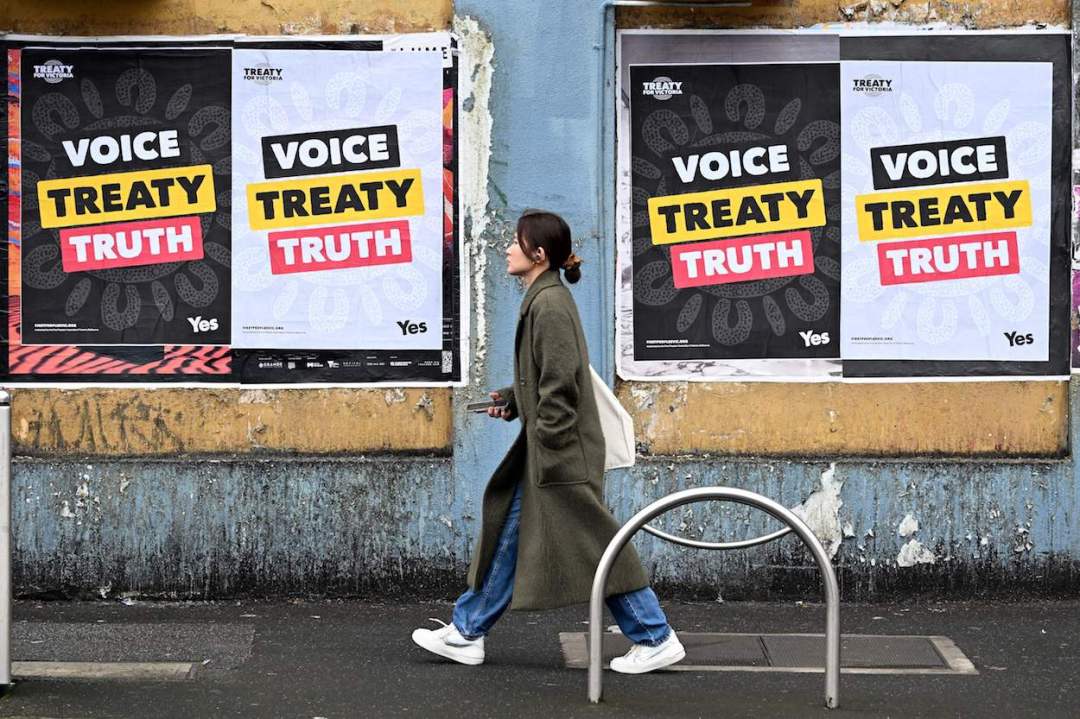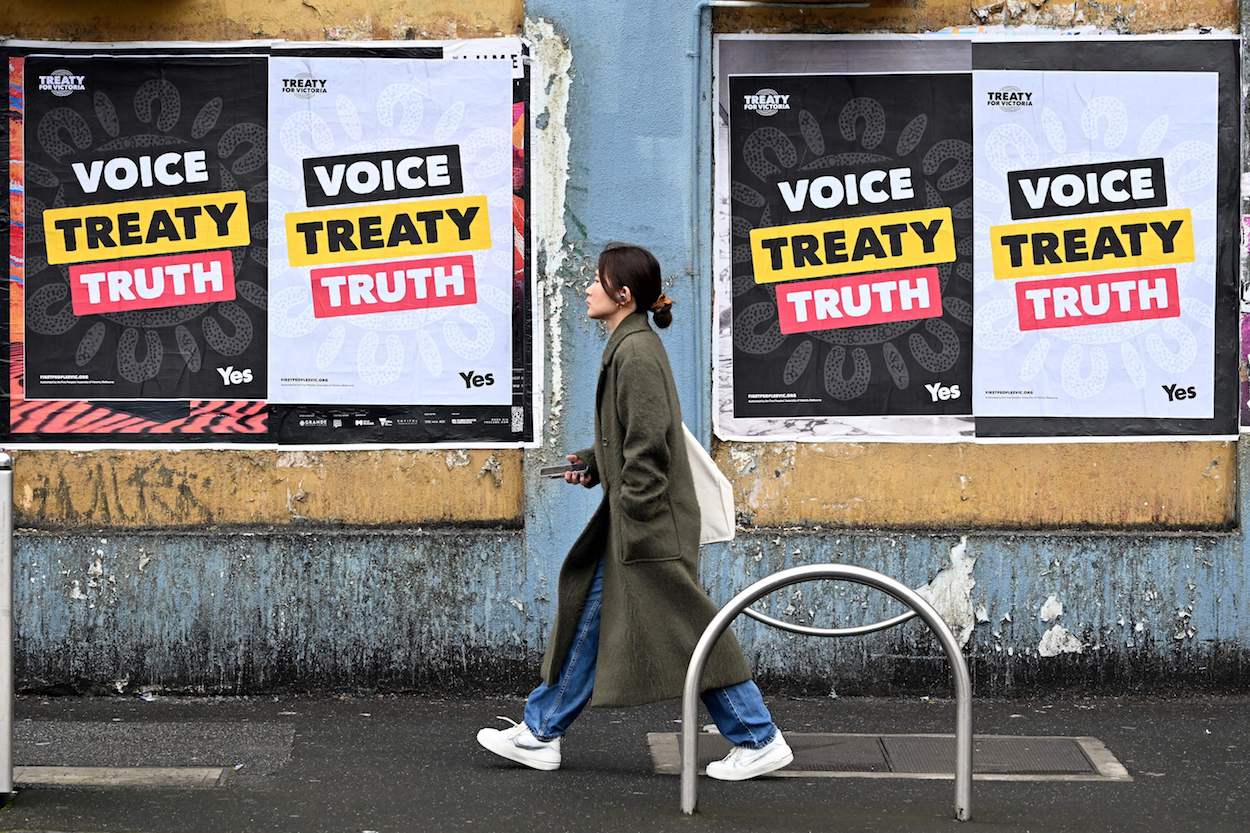Since 1999, asking how many referendums Australia has had – then how many have passed – has been a pair of standard pub quiz questions. Everyone knew we’d had 44 since Federation in 1901 and only eight had ever passed.
Well, questioners in pubs across the country will have to make a minor update. Australia has now had 45 referendums, for a meagre harvest of eight changes to its written constitution. The Voice to parliament has been voted down even more comprehensively than the Republic was in 1999. It lost in every state and one of the country’s two sparsely populated territories. If it were possible to kill it any deader, it’s difficult to see how.
Australia is a proud constitutional bowerbird. A Westminster system with a bicameral parliament, yes, the country also enshrines a federalism so intense it shocks many Americans. It’s possible for an individual state to vote (by referendum) to secede, for example, something that once happened. Australia also – when developing its constitutional arrangements in the late 19th century – copied the Swiss when it comes to changing its founding document.
Pro-Voice partisans then did not help themselves by stigmatising opponents and undecideds as racist or ignorant
Section 128 provides that the constitution can only be amended by referendum. Any proposed amendment must be put to the Australian electorate. It also requires a ‘double majority’ Yes:
- A majority of voters in a majority of states (a majority Yes vote in at least four of the six states); and
- A national majority of all voters (an overall Yes vote of more than 50 per cent of all voters in favour of the proposed change, taking in voters in both the states and the territories).
- Note: the territories only contribute to the overall majority sum – not the majority of voters in a majority of states sum – precisely because they are territories.
If there’s a double majority, the constitution is changed.Voting in referendums – like federal and state elections – is compulsory. Australians vote a lot and are an unusually well-informed electorate. Elections – always held on a Saturday – are beautiful, carnivalesque celebrations of democracy. Australians stream out of their houses and workplaces, buy snacks (including the famous ‘democracy sausage’) and drinks at polling places (usually primary schools), collect glossy how-to-vote cards – advisory only – from booth-workers representing different political parties and then vote in a spirit of general bonhomie.
This is a country that takes democracy very seriously, despite light-hearted photos of people voting in budgie-smugglers and bikinis flashing around the world after every poll. Yesterday, the Australian people voted on whether ‘to alter the Constitution to recognise the First Peoples of Australia by establishing an Aboriginal and Torres Strait Islander Voice’. The first time Australia’s extraordinary electoral system had been put to the test over a culture war issue, it passed with flying colours, but the process has left the country divided.
The proposed amendment to the Constitution would have added the following Chapter and section:
Chapter IX Recognition of Aboriginal and Torres Strait Islander Peoples
129 Aboriginal and Torres Strait Islander Voice
In recognition of Aboriginal and Torres Strait Islander peoples as the First Peoples of Australia:
(1) there shall be a body, to be called the Aboriginal and Torres Strait Islander Voice;
(2) the Aboriginal and Torres Strait Islander Voice may make representations to the Parliament and the Executive Government of the Commonwealth on matters relating to Aboriginal and Torres Strait Islander peoples;
(3) the Parliament shall, subject to this Constitution, have power to make laws with respect to matters relating to the Aboriginal and Torres Strait Islander Voice, including its composition, functions, powers and procedures.
When first proposed in September last year, support for the Voice polled between 60 and 70 per cent. Newly-elected Labor PM Anthony Albanese thought he was onto a winner.
However, as time passed, support drained away. Some of this was Albanese’s (and Labor’s) fault: they took control of the campaign and micromanaged it to suit themselves, most notably by abandoning any idea of a constitutional convention or parliamentary process for public involvement. At one point, Albanese hand-picked a referendum working group of 21 Aboriginal and Torres Strait Islander people with whom the government would negotiate in confidence.
However, the bulk of the failure has roots in the fact that the Voice – if passed into law – looked like awarding a group of people extra political rights based on their race. Aware that this was No’s strongest argument, Yes tried to rebut it by pointing out that there is only one human race, which makes it impossible to draw distinctions based on race. The distinction, Yes claimed, is one only of ancestry, and refers to ‘inherent rights Aboriginal and Torres Strait Islander peoples hold as the original inhabitants of the Australian continent.’
This is one of those technically true things: biological race does not exist among humans. We are not genetically distinct enough. Chimpanzees possess biological race (biologists use the term ‘sub-species’). Humans don’t. However, Aboriginal ancestry in even tiny amounts stands out when it turns up in a 23andMe test. The Yes team claim that the Voice wasn’t about race thus looked like legerdemain: descent from the First Peoples of Australia (a real thing) was being used to draw distinctions between people in the same way that 19th-century racists drew distinctions on race (not a real thing).
Once Senator Jacinta Nampijinpa Price, the No campaign’s eloquent Aboriginal leader, got this point across to first opposition leader Peter Dutton (in April) and later the electorate – probably in about July this year – the Voice was toast. Bipartisan support is necessary but not sufficient for a referendum to pass. Pro-Voice partisans then did not help themselves by stigmatising opponents and undecideds as racist or ignorant, driving support down further. Australians do not like being treated as mugs or played for suckers. Yesterday they delivered a sharp rebuke to those who would do both.







Comments